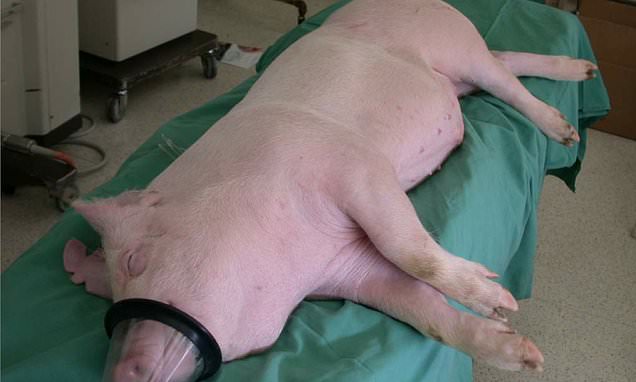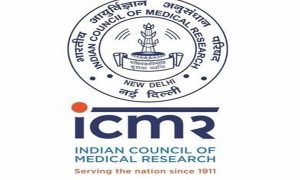Pig hearts may be adapted for human use within three years in a breakthrough move that could clear the UK donor list, a leading surgeon has said.Sir Terence English, who performed Britain’s first ever successful heart transplant, said his mentee from the 1979 operation will try to replace a human kidney with a pigs before the end of the year.He believes this could pave the way for more complicated organ transplants in the process called ‘xenotransplantation’. Sir Terence English, who performed Britain’s first ever successful heart transplant, said his mentee from the 1979 operation will try to replace a human kidney with a pigs before the end of the year (file picture) Sir Terence (pictured) believes this could pave the way for more complicated organ transplants in the process called ‘xenotransplantation’ Professor Christoper McGregor (pictured) has made two ‘knock-out’ genes that may allow pigs organs to be used in humansSir Terence told the Sunday Telegraph: ‘If the result of xenotransplantation is satisfactory with porcine kidneys to humans then it is likely that hearts would be used with good effects in humans within a few years.’If it works with a kidney, it will work with a heart. That will transform the issue.’The demand for donor organs for transplantation outweighs the supply, with 280 people in the UK waiting for a heart.It has been suggested the supply of human donor organs could be substituted with those taken from animals or those grown independently in the lab.Pig organs could be a good choice for transplantation into human patients, as their organs tend to be similar in size. Professor Christoper McGregor, who was the senior registrar for Sir Terence 40 years ago today when they operated on Keith Castle, has made two ‘knock-out’ genes that may allow pigs organs to be used in humans. WHAT IS XENOTRANSPLANTATION? The transplantation of a healthy heart from one animal into the body of another species is known as xenotransplantation.It has long been heralded as a potential avenue to cure people suffering with life-limiting and life-threatening cardiac conditions.Waiting lists for transplants from dead, or allogenic, donors is growing as life expectancy increases around the world.Many chronic conditions result in death if a transplant is not successful.The World Health Organisation define it as: ‘Living cells, tissues or organs of animal origin and human body fluids, cells, tissues or organs that have with these living, xenogeneic materials, has the potential to constitute an alternative to material of human origin and bridge the shortfall in human material for transplantation.’A statement from the WHO also urges Member States to ensure effective national regulatory control and surveillance mechanisms before allowing xenogeneic transplantation to take place.It can be extremely dangerous to patients as the natural immune response from the body often rejects the organ. The University of Alabama professor thinks his team’s method could work for a kidney transplant within a few months. Sir Terence added: ‘There will be animal rights people who will say it’s entirely wrong. But if you can save a life isn’t that maybe a bit better?’It comes as researchers have been using cutting-edge gene editing techniques to modify the organs before transplant to decrease the risk that they will be rejected by the donor’s body.Harvard University geneticist George Church, the co-founder and adviser of US-based firm eGenesis, is another working to adapt pig organs so that they might ultimately be made suitable for transplant into human patients. Professor Church and his colleagues are using the CRISPR gene editing technique to modify pig organs so they are less likely to be rejected.Once modified, eGenesis researchers are testing the viability of the organs after transplanting them into monkeys in tests at the Massachusetts General Hospital in Boston, in the US.’What we’re doing is a necessary step,’ says James Markmann, who is Massachusetts General’s chief of transplant surgery as well as an eGenesis adviser.’We’d be hard-pressed to put a modified organ into a human until it’s been tested in a large animal,’ he added. Researchers like Harvard University’s Professor George Church (pictured) are using cutting-edge gene editing techniques to modify the organs before transplant to decrease the risk that they will be rejected by the donor’s bodyThe exact nature of the current experiments — which organs are being transplanted, the species of the recipient experimental monkeys and the details of how the pigs are being raised — remains under wraps, reported the MIT Technology Review in June.This is not the first time, however, that pig organs have been transplanted into primates.Previously, researchers from the US National Institutes of Health managed to implant pig hearts inside baboons, alongside the monkeys’ natural hearts. The transplantation of a healthy heart from one animal into the body of another species is known as xenotransplantation. It has long been heralded as a potential avenue to cure people suffering with life-limiting and life-threatening cardiac conditionsThe experts succeeded at keeping the baboon hearts alive and beating for two years.In another study, last year, German researchers reported that several baboons were kept alive for around six months after their hearts were replaced with those taken from pig donors.If these experiments ultimately prove successful, researchers may eventually move to testing whether cross-species transplants might be used in humans and potentially relieve the present demand for donor organs.






















 WhatsApp us
WhatsApp us
Pingback: Jelle Hoffenaar
Pingback: Medium Mireille
Pingback: 카지노사이트
Pingback: ไลน์ เงินด่วน
Pingback: teen love doll
Pingback: bitcoin registrarse chile
Pingback: Regression Testing
Pingback: JVC GR-D20 manuals
Pingback: 인싸포커
Pingback: Urban Nido
Pingback: euroclub
Pingback: www.richardmillereplicawatches.com
Pingback: Six hours in the dark: What really happened when Facebook Instagram and WhatsApp went down
Pingback: mossberg guns for sale
Pingback: 주소용
Pingback: sell good cvv
Pingback: bradford escort girls
Pingback: สล็อตวอเลท
Pingback: my site
Pingback: Scrum Velocity
Pingback: บาคาร่าเว็บตรง
Pingback: ufabet
Pingback: Boerefijn Tech
Pingback: visit our website